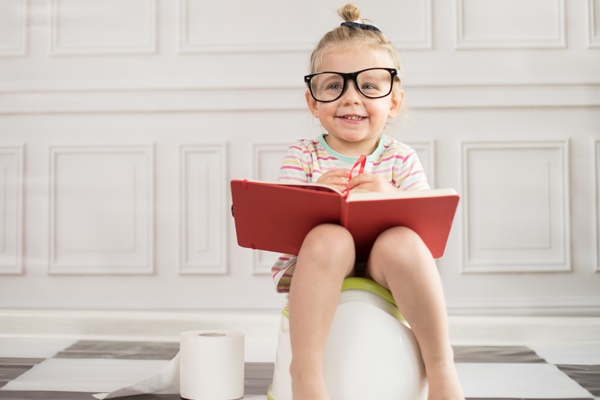
Parents basically have two questions when it comes to potty training. When and how? But, unfortunately, there is no straight forward answer here. Mixed messages from parents and friends may all add to the confusion. When it comes to potty training, one size doesn’t fit all!
Leaping from diapers to the “big-kid” potty chair is no small task! But, stay calm (do those words even exist in the parenting world?) and don’t despair. Look at us … all potty trained successes!
Although most kids are potty trained between ages 2 or 3 (with boys typically achieving the feat later than girls), the most important thing to remember is to wait until your child, and family, are ready to make it a positive experience.
It’s not starting at a specific age that’s important; it’s about starting when your child is physically and emotionally ready. Timing is everything! So, tune in to your toddler and see where they’re at with this progression. You may end up starting earlier, or later, than you thought.
How do I know when my child is ready for potty training?
The physical signs of readiness will include the ability to sit, stand and walk with ease. Bowel movements will be more regular and you’ll notice that your toddler will be dry during most naps and at night-time. They will experience discomfort when her diaper is wet or soiled; walking with a wide-legged waddle or tugging at her diaper, is a dead giveaway!
Motor skills to look out for will include the ability to pull her pants down or to remove her own diaper independently.
They will be able to communicate the need to go before it happens. Common potty words such as pee-pee, poop, wet or dry, will most likely be part of everyday life. They will be able to follow simple instructions and actually stop what they’re doing to poop in her diaper! Emotional and social readiness could be indicated by showing an interest in other people by trying to imitate them.
If you nodded your head to most of these milestones, your child may be ready for potty training.
Here are a few potty training tricks:
- Get set, go! Take them with to select a potty. This will peak your toddlers curiosity about what the purpose of this little chair is.
- Location, location, location. Let them move the potty around and get comfortable with it. Let them sit on it with their diaper at first. Personalize it, write their name on it and explain that this is their special chair for pee-pee and poop. You could gradually move closer to the bathroom and eventually work your way up to a seat on top of the toilet.
- It’s all about the bribes! Bribery is highly recommended. Figure out a reward system that matches your parenting style. Whether it’s sweeties or giving a sticker every time she uses the potty. Sometimes a hug or high five is all the incentive they’ll need.
- All caregivers must be on the same page. Everyone caring for your “pooper-in -training” must agree on one strategy to achieve success.
- Heap on the praise. Make a big deal out of small successes. Even if they sit there without anything happening, praise them for trying.
- Teach your little boy how to urinate while sitting on the potty (some boys may need to push down on their penis to prevent the urine from spilling). As he grows taller, he can learn to urinate from a standing position. Add a few Cheerios to the water to improve his aim!
- Keep consistent potty break times. Put them on the potty every 20 minutes. Patience is a virtue!
- If you’re comfortable with an audience, allow them to join you in the toilet. Let them flush or bunch up the toilet paper.
- Always keep things positive. Never show irritation.
- Know when it’s time to take a break. Once you notice emotional distress, toilet training should be postponed for at least a month. When they refuses to participate in any activity, they’re not ready.
Mastering the potty could take up to 3 months. Your child will likely need help with wiping after a bowel movement until age 4 or 5.
Exercise patience and praise beyond belief, potty training success will happen!




 Publications
Publications
 Partners
Partners










